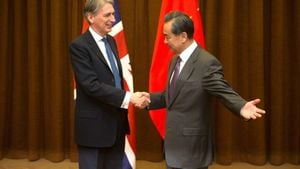The migration crisis is once again taking center stage on the European political agenda, especially following the recent upheaval in Syria. After the unexpected overthrow of Bashar al-Assad, discussions are heating up as to what this means for the thousands of Syrians who sought refuge across Europe and the policies governing their asylum procedures. Notably, about 15 EU countries have decided to freeze asylum requests from Syrian citizens, worrying human rights advocates and international observers alike.
At the heart of this political shift is Mary Khan, a Member of the European Parliament (MEP) from the right-wing German party Alternative für Deutschland (AfD). Khan has championed the cause for more stringent asylum policies, positioning herself at the forefront of the burgeoning movement to return Syrian migrants home. The AfD has gained traction among German voters, fueled by rising concerns about crime committed by migrants, prominently featuring statistics about increasing violence attributed to Syrian nationals. Khan cites rising criminal activity as one of the reasons for her resolution, which seeks to repatriate Syrians now deemed less at risk following the regime change.
Bearing the increasing scrutiny of the German populace, she stated, "There is a clear and growing demand by European citizens for the EU to impose stricter policies.” This reflects broader sentiments across Europe, as countries grapple with the realities of hosting significant numbers of refugees. Just last year, over 183,000 Syrians sought asylum, continuing the trend of Syria being the leading nationality among asylum seekers since 2013.
Recent events, including the alarming rise of crime rates associated with refugees, exacerbate the matter. Khan pointed out over 35,000 suspected Syrian criminals currently identified within Germany, showcasing the need for tightened immigration controls. The situation may spur other nations to take similar measures, aligning with actions already seen from Czechia and Slovakia, reinforcing the shared anxieties related to immigration and security.
The European Union has the spotlight on it now, as tensions mount from the fallout of the Assad regime's collapse. EU interior ministers convened to discuss key legislation affecting not only Syria but broader immigration policies across Europe. The decisions they make today will shape the reception of asylum seekers for years to come, and municipalities across the EU are bracing for their consequences.
But the pathway to repatriation may be fraught with complexity. Many advocating for the swift deportation of Syrians clarify the importance of addressing the stability within Syria and whether it is safe for returnees. Critiques of the EU’s policies point toward questions of protections for human rights and the overall future of the region amid fear of new conflict brewing.
Recent commentary also raised significant concerns over the motivations behind the EU’s push to repatriate. Some analysts argue this approach conveys political opportunism rather than genuine concern for the well-being of those displaced. The political narrative quickly shifts to focus on migrants as liabilities rather than people with lives and stories worth listening to. Frustration within European discourse continues to grow as public sentiment shifts and resurfaces questions about humane treatment amid policy changes.
"The rise of Assad's downfall is not the end of these discussions; it’s merely another chapter about how Europe can politically maneuver the tides of refugee policies,” said one European analyst. The concern remains if the EU truly aligns its actions with humanitarian principles or if political expediency is driving the narrative.
Meanwhile, the political unrest within Syria itself poses challenges for returnees. Various political organizations, such as Hayat Tahrir al-Sham (HTS), have indicated their intent to control the new political narrative and the governance of the region. HTS’s ascent does not assure safety or stability to those who fled, leading some to argue against the feasibility of widespread returns.
Despite signs of upheaval creating hope for some, caution prevails among those who have spent years uprooted from their homes, living lives punctured by uncertainty. Would it not be wiser for the EU to probe more deeply before facilitating questionable returns instead of hastily opting for policy revisions based on transient political trends?
While EU leaders present themselves as determined to resolve issues with migration, the underlying discussion revolves around the complex reality faced by millions of Syrians displaced by war. Refugees are not merely statistics; they are individuals with aspirations, traumas, and voices. Maybe the true challenge lies less with handling their numbers and more with recognizing their humanity.
With the clock ticking, preparations are already underway. The EU Commission is actively answering concerns over what can be narrowly defined as ‘weaponizing' migrants—an assertion made by some leaders when discussing policies related to countries like Belarus and Russia, insinuated as using migration as a tool against EU stability. Poland and other eastern nations are eyeing stringent measures to deal with what they encounter on their borders.
Prime Minister Donald Tusk has already announced plans to establish temporary asylum suspensions, arguing them necessary to preserve nation-state security, whereas criticism from rights organizations denounces the move as counterproductive to EU commitments of solidarity among member states.
Wouldn't it be more pragmatic for the EU to reflect on what genuine solutions would look like, considering both the migrants’ plight and the socio-political makeup of its own member states? The consensus reveals the urgent need for cohesive strategies and harmonized policies directed at addressing both humanitarian needs for asylum seekers and the sociopolitical repercussions of re-establishing home countries post-conflict.
The fall of Assad’s regime presents Europe with both unprecedented opportunities and challenges; how the EU chooses to align itself with reform, compassion, and practicality will define its commitment to upholding human rights amid turbulent global sentiments toward migration.
The upcoming meeting among interior ministers will be pivotal. The agenda includes significant questions on refining anti-smuggling measures, exploring asylum procedures, and holding firm against the looming challenges migration poses nationally and collectively for the EU. Each decision impacts not only the directive of Syrian migrants but echoes through the corridors of policy-making within Europe, shaping cultural attitudes toward immigrants and refugees.
Many within Brussels believe the best possible outcome rests on establishing safe routes and means for those who seek refuge, as well as focusing efforts on stabilizing conflict zones. Not just as means to prevent another wave of migration but to build pathways for peace and security—a dual effort to reclaim lost trust from citizens and lost potential from the displaced populations.
How exactly will history judge this chapter of European migration policies? The answers may be lurking inside the nuances of every decision made at the table today, pivoting the fate of countless individuals as they navigate the precarious waters of migration politics.



